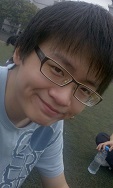Jinlai Xu

PhD Student, School of Information Sciences
Graduate Student Assistant, The Laboratory for Education and Research on Security Assured Information Systems (LERSAIS)
University of Pittsburgh (PITT)
Email: xujinlai [at] gmail.com
Full Curriculum Vitae
RESEARCH INTERESTS:
Cloud Computing, Machine Learning, Computer Vision, Robotics.
EDUCATION
September 2015 - present: PhD (expected), Information Science University of Pittsburgh Advisor: Balaji Palanisamy
September 2012 - July 2015: Master of Software Engineering China University of Geosciences (211) Advisor: Zhongwen Luo
GPA – 89.9/100, Major GPA – 91.9/100
September 2008 - July 2012: Bachelor of Engineering in Software Engineering ,China University of Geosciences (211) Advisor: Zhongwen Luo
GPA – 88.6/100, Major GPA – 92.9/100, ranked 1st/96.
